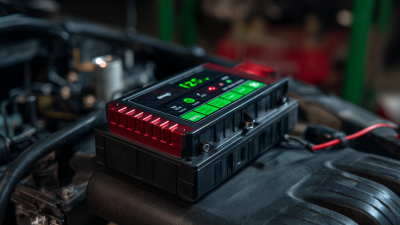The Ultimate Guide to Charging Power Stations for Your Electric Vehicles
Table of Contents
- Understanding the Different Types of Charging Power Stations for EVs
- The Importance of Charging Speed and Compatibility with Your Electric Vehicle
- Exploring the Costs Associated with Installing and Using Charging Stations
- Key Features to Look for in a Charging Power Station
- The Role of Renewable Energy in Powering Electric Vehicle Charging Stations
- Future Trends in Electric Vehicle Charging Solutions and Technologies
- FAQS
- Conclusion
- Related Posts
As the adoption of electric vehicles (EVs) continues to rise, with projections indicating that over
30% of global car sales will be electric by 2030
(International Energy Agency, 2023), the demand for
Charging Power Stations
is becoming increasingly critical.
 Roofer Electronics Technology (Shanwei) Co., Ltd., with over
27 years of expertise
in R&D, manufacturing, and solution services for lithium batteries and energy storage systems, is poised to play a vital role in this evolving landscape.
The integration of
robust battery technologies
not only enhances the efficiency of Charging Power Stations but also supports sustainable energy initiatives.
As reported, the global market for EV charging infrastructure is expected to reach
USD 100 billion by 2027, highlighting the immense potential for innovation and investment in this sector.
Roofer’s advanced solutions are uniquely positioned to meet the growing needs of households and industries transitioning to electric mobility, ensuring reliable power supply and energy independence.
Roofer Electronics Technology (Shanwei) Co., Ltd., with over
27 years of expertise
in R&D, manufacturing, and solution services for lithium batteries and energy storage systems, is poised to play a vital role in this evolving landscape.
The integration of
robust battery technologies
not only enhances the efficiency of Charging Power Stations but also supports sustainable energy initiatives.
As reported, the global market for EV charging infrastructure is expected to reach
USD 100 billion by 2027, highlighting the immense potential for innovation and investment in this sector.
Roofer’s advanced solutions are uniquely positioned to meet the growing needs of households and industries transitioning to electric mobility, ensuring reliable power supply and energy independence.
Understanding the Different Types of Charging Power Stations for EVs
Understanding the different types of charging power stations for electric vehicles (EVs) is crucial for maximizing efficiency and convenience. Charging stations broadly fall into three categories: Level 1, Level 2, and fast chargers. Level 1 chargers, often standard household outlets, provide the slowest charging speed, suitable for overnight charging of plug-in hybrids or for EVs with smaller battery capacities. Conversely, Level 2 chargers significantly reduce charging time and are ideal for home or public use, offering around 10-60 miles of range per hour of charge. DC fast chargers represent the pinnacle of charging technology, capable of delivering 80% charge in approximately 30 minutes, making them essential for long-distance travel.
Tips: When planning your charging strategy, consider your driving habits. If most trips are short, a Level 1 or Level 2 charger may suffice. However, for regular long drives, investing in a fast charger will enhance convenience significantly. Additionally, location is key; choosing a charger close to frequently traveled routes can save time, especially if using dedicated fast-charging networks.
As electric vehicle adoption surges—projected sales to soar by 27% in 2024—understanding charging infrastructure becomes paramount. With data from studies involving over 1.6 million EVs, it is evident that while more charging stations are needed, the development of varied charger types will cater to diverse usage patterns, ensuring that all drivers find solutions that meet their charging needs effectively.
The Importance of Charging Speed and Compatibility with Your Electric Vehicle
When it comes to charging electric vehicles (EVs), speed and compatibility are paramount factors that every driver must consider. The charging speed of a power station significantly affects how quickly you can get back on the road. Fast chargers utilize higher voltages and currents to reduce downtime, providing a significant advantage for those on long journeys or navigating busy schedules. Understanding the various types of chargers—such as Level 1, Level 2, and DC fast chargers—can help drivers make informed decisions about where and when to charge their vehicles.
Compatibility plays a crucial role in ensuring a seamless charging experience. Not all EVs use the same charging connectors or protocols, meaning that drivers must be aware of their vehicle's requirements before arriving at a charging station. This makes it essential for manufacturers and charging station providers to offer versatile solutions that cater to a wide range of vehicle models. Moreover, staying updated with the latest advancements in charging technology can also provide drivers with options that enhance their EV's efficiency and flexibility, ultimately influencing their overall satisfaction with electric vehicle ownership.
The Ultimate Guide to Charging Power Stations for Your Electric Vehicles
| Charging Station Type | Max Charging Speed (kW) | Compatibility | Average Price ($) | Installation Type |
|---|---|---|---|---|
| Level 1 Charger | 1.4 | Most EVs | 300 | Home |
| Level 2 Charger | 7.2 | Most EVs | 500 | Home/Public |
| DC Fast Charger | 50-350 | Select EVs | 10,000 | Public |
| Wireless Charger | Up to 11 | Compatible Models | 3,000 | Home |
Exploring the Costs Associated with Installing and Using Charging Stations
When considering the installation and operation of charging power stations for electric vehicles (EVs), it's crucial to understand the associated costs. According to a report by the International Energy Agency (IEA), the average cost of installing a Level 2 residential charging station ranges from $500 to $2000, depending on the installation complexity and the specific hardware chosen. For public charging stations, costs can escalate significantly, with some installations exceeding $100,000 when accounting for infrastructure, permits, and equipment.
Operational costs also must be taken into consideration. A study by the U.S. Department of Energy found that electricity prices for charging can vary widely based on location and time of use. On average, drivers can expect to pay between $0.10 to $0.40 per kWh, making it vital to choose a charging plan that aligns with your driving habits. Moreover, maintenance can add to the overall cost; many operators report spending an estimated $500 to $1,000 annually on upkeep and repairs.
**Tips:** To save on installation, compare multiple quotes from certified electricians, and investigate local incentives that could offset initial costs. Additionally, consider the charging capabilities of your EV; higher capacity chargers can provide faster charging but may require upgraded electrical service, which can further impact your budget. Lastly, leveraging time-of-use pricing plans can significantly reduce your electricity bills when charging during off-peak hours.
Key Features to Look for in a Charging Power Station
When selecting a charging power station for your electric vehicles, there are several key features to consider to ensure optimal performance and efficiency. One of the primary aspects is charging speed; stations that utilize high-capacity lithium battery technology, like those developed by Roofer Electronics Technology (Shanwei) Co., Ltd., can greatly reduce charging times. Recent studies show that fast-charging stations can deliver up to 80% charge in just 30 minutes, making them ideal for users who need quick and reliable energy replenishment on the go.
Another important feature is compatibility with various electric vehicle models. A versatile charging station that supports multiple connectors and standards, such as CCS and CHAdeMO, will accommodate a wide range of vehicles, enhancing its usability. Additionally, energy management capabilities such as smart charging, which optimizes power usage based on demand and electricity rates, are increasingly becoming a standard in modern charging solutions. For example, reports indicate that smart charging can reduce energy costs by up to 30%, making it a sound investment for both consumers and businesses. With over 27 years of expertise in lithium batteries and energy storage systems, Roofer stands at the forefront of integrating these advanced features into their products.
The Role of Renewable Energy in Powering Electric Vehicle Charging Stations
As the adoption of electric vehicles (EVs) continues to rise, the integration of renewable energy sources into charging stations is becoming increasingly crucial. Renewable energy plays a pivotal role in creating sustainable solutions for powering EV charging stations, reducing reliance on fossil fuels and minimizing carbon emissions. Solar panels, wind turbines, and other renewable technologies can be seamlessly integrated into charging infrastructures, allowing operators to harness clean energy for charging activities. This not only enhances the environmental benefits of electric vehicles but also drives down operating costs by utilizing free and abundant natural resources.

At Roofer Electronics Technology (Shanwei) Co., Ltd., our extensive experience in lithium battery R&D and manufacturing positions us well to support the renewable energy sector in powering EV charging stations. With over 27 years dedicated to energy storage solutions, we provide advanced battery products that can efficiently store energy from renewable sources. Our solutions are designed for a variety of applications, including household energy storage and electric mobility, ensuring that charging stations have a reliable and sustainable power supply. By leveraging our expertise, the transition to greener energy solutions for electric vehicle charging can be achieved more effectively, paving the way for a cleaner and more sustainable future in transportation.
Future Trends in Electric Vehicle Charging Solutions and Technologies
As electric vehicles (EVs) continue to gain traction globally, innovative charging solutions are paramount to accommodating their rapid adoption. The market for Vehicle-to-Home (V2H) energy management systems is projected to grow significantly, from an estimated $93.58 million in 2024 to a staggering $532.59 million by 2032, reflecting a robust compound annual growth rate of 24.28%. This indicates a shift towards integrating renewable energy sources and mobile energy management systems into daily life, enhancing both the efficiency and convenience of EV charging.
Additionally, advancements in smart charging technology are reshaping the landscape of electric vehicle infrastructure. The smart charging pile market is expected to flourish, with an anticipated growth from $25.49 million in 2023 to over $2.1 billion by 2032, showcasing a remarkable CAGR of 26.62%. This evolution not only empowers consumers with greater control over their energy usage but also aligns with global sustainability efforts, providing a cleaner and more efficient transportation solution. At Roofer Electronics Technology, we are committed to supporting this transition through our extensive experience in lithium battery development and energy storage solutions, crucial for powering the automobiles of the future.

FAQS
: Charging speed and compatibility are the most important factors for EV drivers to consider when charging their vehicles.
The main types of chargers include Level 1, Level 2, and DC fast chargers, each offering different charging speeds.
Faster charging reduces downtime, allowing drivers to quickly get back on the road, which is particularly beneficial during long journeys or busy schedules.
Drivers must be aware of their vehicle's charging connector requirements and make sure the charging station supports those connectors.
Key features include high charging speed, compatibility with various EV models, and energy management capabilities such as smart charging.
Smart charging optimizes power usage based on demand and electricity rates, potentially reducing energy costs by up to 30%.
The V2H market is expected to grow from approximately $93.58 million in 2024 to around $532.59 million by 2032, indicating a significant increase in demand.
The rise of smart charging technology and integration of renewable energy sources are key trends that will impact EV charging infrastructure moving forward.
Roofer Electronics Technology specializes in lithium battery development and energy storage systems, providing advanced charging solutions to support the growing EV market.
The smart charging pile market is anticipated to grow from $25.49 million in 2023 to over $2.1 billion by 2032, reflecting an impressive compound annual growth rate.
Conclusion
Charging Power Stations are essential components for the growing demand for electric vehicles (EVs), offering various types suited for different needs. Understanding their types, including home chargers and public charging stations, is crucial for EV owners. Speed and compatibility with specific electric vehicles play significant roles in enhancing user experience and convenience. Moreover, potential costs associated with installation and usage should be carefully considered to make an informed decision.
As the industry evolves, key features like smart technology integration, user-friendly interfaces, and sustainability through renewable energy sources are increasingly important. With Roofer Electronics Technology's extensive experience in lithium battery solutions, there's a unique opportunity to innovate and enhance charging power stations further, promoting the transition toward greener energy. The future of EV charging will likely see advancements in efficiency, accessibility, and eco-friendliness, paving the way for a sustainable driving experience.
Related Posts
-

How to Choose the Right Charging Power Station for Your Needs
-

How to Optimize Your Lifepo4 Battery Rack for Maximum Efficiency
-

How to Choose the Right Outdoor Power Station for Your Adventure
-

Your Ultimate Guide to Selecting Battery Racks for Optimal Performance and Safety in Energy Storage Systems
-

What Are the Key Benefits of Using 12V Lithium Ion Batteries in Your Devices?
-

Exploring the Benefits of Lifepo4 Battery for Sustainable Energy Solutions





 business@roofer.cn
business@roofer.cn +86 13502883088
+86 13502883088






